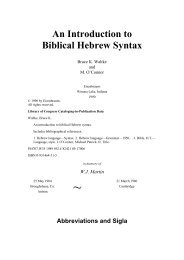a definite rule for the use of the article in the greek new testament
a definite rule for the use of the article in the greek new testament
a definite rule for the use of the article in the greek new testament
You also want an ePaper? Increase the reach of your titles
YUMPU automatically turns print PDFs into web optimized ePapers that Google loves.
None <strong>of</strong> <strong>the</strong> predicates <strong>in</strong> <strong>the</strong> follow<strong>in</strong>g passages has <strong>the</strong> <strong>article</strong> <strong>in</strong> <strong>the</strong><br />
orig<strong>in</strong>al and each <strong>of</strong> <strong>the</strong>m precedes <strong>the</strong> verb. In Hebrews 9:15 it is claimed that<br />
Jesus is (<strong>the</strong>) mediator <strong>of</strong> a <strong>new</strong> covenant, <strong>in</strong> 1 Timothy 6:10 <strong>the</strong> love <strong>of</strong><br />
money is identified as (<strong>the</strong>) root <strong>of</strong> all evil, <strong>in</strong> John 10:2 <strong>the</strong> one who enters by<br />
<strong>the</strong> door is (<strong>the</strong>) shepherd <strong>of</strong> <strong>the</strong> sheep, <strong>in</strong> Mat<strong>the</strong>w 5:35 Jerusalem is (<strong>the</strong>) city<br />
<strong>of</strong> <strong>the</strong> Great K<strong>in</strong>g, 13 <strong>in</strong> Mark 2:28 <strong>the</strong> Son <strong>of</strong> Man is also (<strong>the</strong>) lord <strong>of</strong> <strong>the</strong><br />
Sabbath, <strong>in</strong> 1 Cor<strong>in</strong>thians 4:4 Paul says, “It is (<strong>the</strong>) Lord who must exam<strong>in</strong>e<br />
me,” <strong>in</strong> Revelation 21:22 it is said <strong>of</strong> <strong>the</strong> New Jerusalem that God is (<strong>the</strong>)<br />
temple <strong>in</strong> it, etc. etc. This is a fair sample <strong>of</strong> what lies beh<strong>in</strong>d <strong>the</strong> statistics<br />
given above.<br />
The <strong>rule</strong> that it is <strong>the</strong> exception that proves <strong>the</strong> <strong>rule</strong> f<strong>in</strong>ds no exception<br />
here. The exceptions to <strong>the</strong> <strong>rule</strong> that <strong>def<strong>in</strong>ite</strong> predicate nouns be<strong>for</strong>e <strong>the</strong> verb<br />
omit <strong>the</strong> <strong>article</strong> are about fifteen <strong>in</strong> number 14 . Half <strong>of</strong> <strong>the</strong>m are scattered<br />
around <strong>in</strong> Luke, John, 2 Peter, and Revelation, and <strong>in</strong> five <strong>of</strong> <strong>the</strong>se passages<br />
<strong>the</strong>re is serious manuscript evidence <strong>for</strong> <strong>the</strong> omission <strong>of</strong> <strong>the</strong> <strong>article</strong> accord<strong>in</strong>g<br />
to <strong>the</strong> <strong>rule</strong>. The o<strong>the</strong>r half <strong>of</strong> <strong>the</strong>se exceptions (7) are grouped <strong>in</strong> 1 and 2<br />
Cor<strong>in</strong>thians, and <strong>the</strong>re is no significant manuscript evidence <strong>for</strong> variation here.<br />
Five <strong>of</strong> <strong>the</strong> seven put <strong>the</strong> predicate not only be<strong>for</strong>e <strong>the</strong> verb, but also be<strong>for</strong>e <strong>the</strong><br />
subject, e.g., 1 Cor<strong>in</strong>thians 9:1 ouv to. e;rgon mou u`mei/j evste evn<br />
kuri,w|. Thus <strong>the</strong> order <strong>in</strong> <strong>the</strong>se five Cor<strong>in</strong>thian passages is predicate-subjectverb.<br />
This is obviously a stylism temporarily affected by <strong>the</strong> Apostle to <strong>the</strong><br />
Gentiles, possibly <strong>for</strong> <strong>the</strong> sake <strong>of</strong> greater emphasis. Aside from <strong>the</strong>se five<br />
passages, Paul’s exceptions do not loom up as especially significant.<br />
The o<strong>the</strong>r class <strong>of</strong> exceptions – <strong>the</strong> omission <strong>of</strong> <strong>the</strong> <strong>article</strong> after <strong>the</strong> verb<br />
– conta<strong>in</strong>s more examples 15 . Approximately twenty-six <strong>def<strong>in</strong>ite</strong> predicate<br />
nouns omit <strong>the</strong> <strong>article</strong> after <strong>the</strong> verb 16 . Two <strong>of</strong><br />
13 The Septuag<strong>in</strong>t <strong>of</strong> Psalm 47:3 reads h` po,lij tou/ basile,wj tou/ mega,lou without a verb.<br />
14 Luke 4:41; John 1:21; 6:31; 15:1; 2 Peter 1:17; Romans 4:33; 1 Cor<strong>in</strong>thians 9:1, 2; 11:3, 25; 2 Cor<strong>in</strong>thians<br />
1:12; 3:2, 17; Revelation 19:8; 20:14.<br />
15 Proper names regularly omit <strong>the</strong> <strong>article</strong> <strong>in</strong> <strong>the</strong> predicate when after <strong>the</strong> verb, <strong>the</strong>y are not <strong>in</strong>cluded here. For<br />
relative cla<strong>use</strong>s, cf. p. 17.<br />
16 Mat<strong>the</strong>w 20:16; Mark 4:32; 9:35; 12:28; Luke 20:33; 22:24; John 4:18; 18:13, 37; Acts 10:36; Romans<br />
4:11, 16; 7:13; 8:16, 29; 11:6; 1 Cor<strong>in</strong>thians 12:27; 16:15; 2 Cor<strong>in</strong>thians 5:21; 6:16; Galatians 4:31; 1<br />
Thessalonians 4:3; 1 Peter 5:12; Hebrews 11:1.<br />
18












